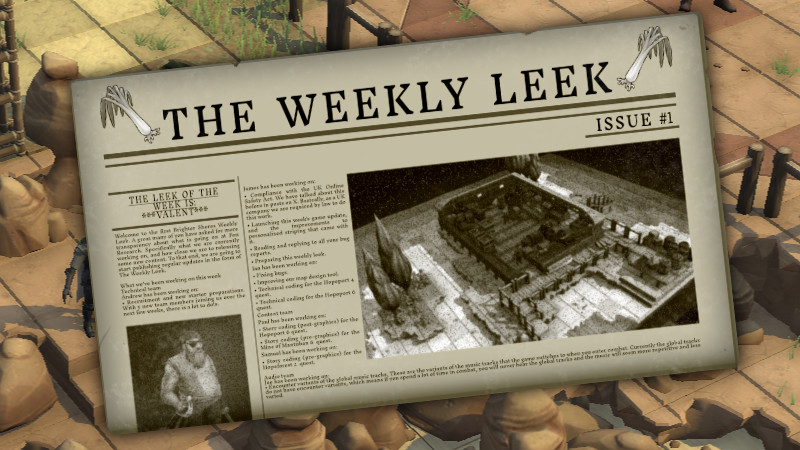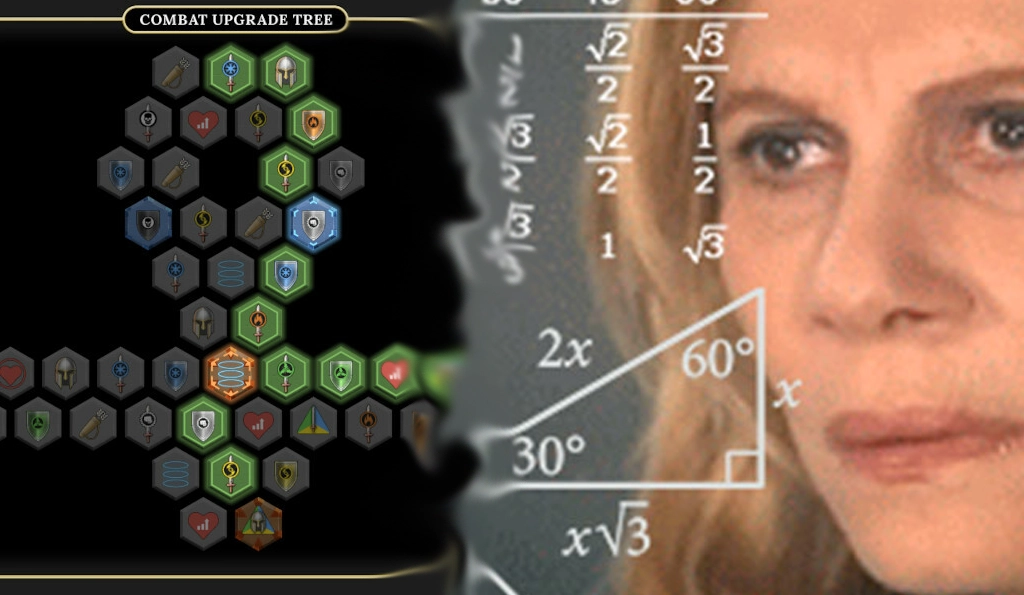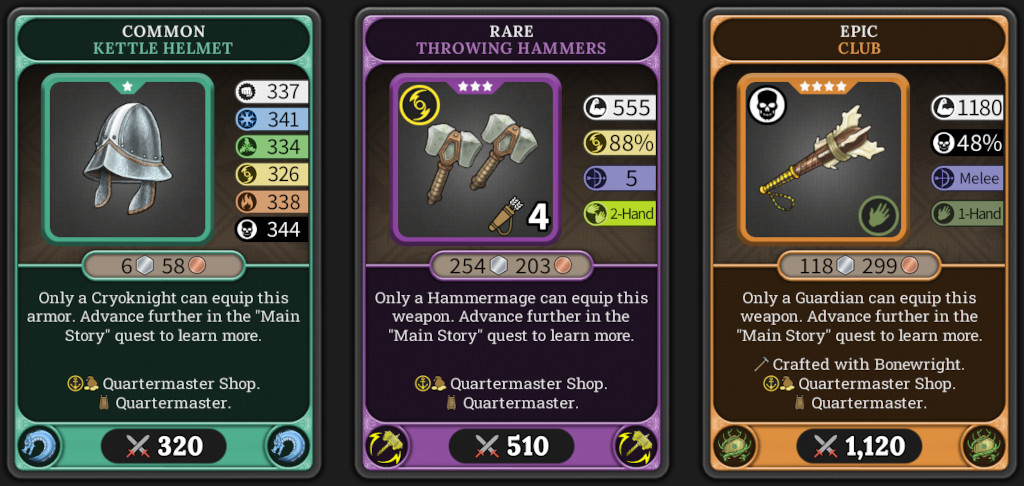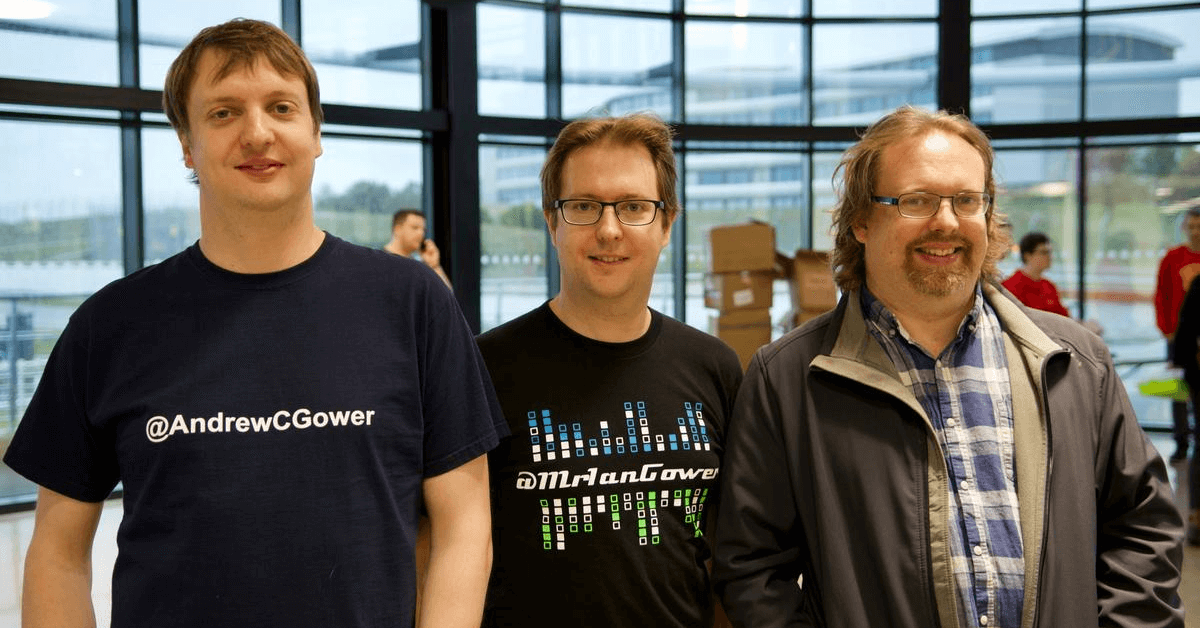
Andrew Gower: The Visionary Behind RuneScape and Brighter Shores
Published in Lore on May 28th, 2024
Andrew Christopher Gower (𝕏), born on December 2nd, 1978, in Nottingham, England, is a pioneering game developer renowned for his work in the MMORPG genre. From a young age, Andrew exhibited a passion for programming and game design. His early exposure to computers and coding sparked a lifelong interest in creating digital worlds, laying the foundation for his future successes.
The Birth of RuneScape
Andrew Gower's journey into the world of game development began in earnest in the late 1990s. Along with his brother Paul, he started developing games as a hobby while studying at the University of Cambridge. Their early projects included several small-scale games, but it was the concept of RuneScape that would eventually capture their imaginations and lead to groundbreaking success.
Initially conceived as a text-based MUD (Multi-User Dungeon), RuneScape was envisioned as an online game where players could interact, complete quests, and explore a vast fantasy world. This idea soon evolved, and the Gower brothers decided to incorporate graphical elements, transforming RuneScape into one of the early examples of a graphical MUD. The game's development began in their parents' house in Nottingham, with Andrew handling the programming and Paul focusing on content creation and design.
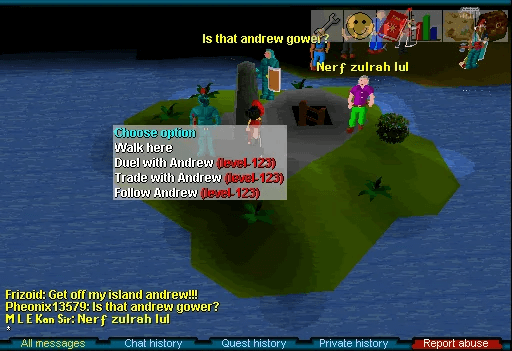
Development and Early Success
RuneScape's first public version was released as a beta on January 4th, 2001. The game was developed using Java, which allowed it to be played directly in a web browser without the need for any downloads. This accessibility was a significant factor in its early popularity. Players could easily log in, create characters, and start their adventures in the medieval fantasy world of Gielinor.
The initial version of RuneScape featured a mix of 2D and 3D graphics, which was quite innovative for browser-based games at the time. The game offered a wide range of activities, including combat, trading, and skill training, allowing players to choose their paths and set their goals. This open-ended gameplay, combined with frequent updates and the addition of new content, helped RuneScape attract a growing player base.
Formation of Jagex
As RuneScape's popularity soared, managing the game's operations and community became increasingly complex. In December 2001, Andrew, Paul, and their friend Constant Tedder formally established Jagex (Java Gaming Experts) to handle the business and technical aspects of running RuneScape. Jagex provided the necessary infrastructure and resources to support the game's rapid growth.
One of Jagex's early innovations was the creation of RuneScript, an interpreted domain-specific scripting language used by RuneScape's server for event handling. This allowed for more complex in-game events and interactions, enhancing the overall player experience. Additionally, Jagex introduced a membership model in February 2002, offering paying players access to exclusive areas, quests, and items, further boosting the game's appeal and revenue.
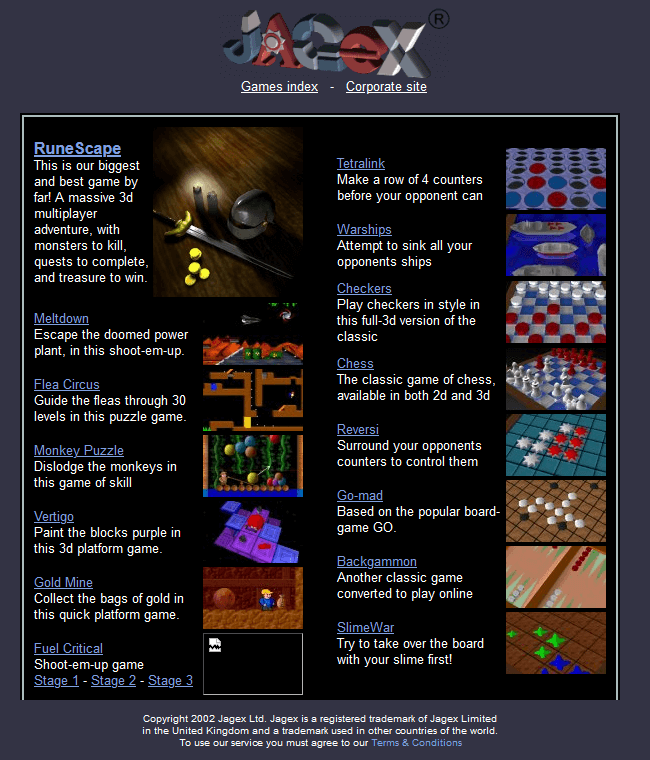
The Rise of a Gaming Phenomenon
Under Jagex's management, RuneScape continued to expand and evolve. The game's player base grew exponentially, and it soon became one of the most popular MMORPGs in the world. By incorporating player feedback and regularly updating the game with new content, Andrew and his team kept the community engaged and invested in the game.
In 2004, Jagex released RuneScape 2, a significant update that overhauled the game's graphics and mechanics. This new version retained the core elements that players loved while introducing improved visuals and a more refined gameplay experience. RuneScape 2's launch was a massive success, solidifying the game's position as a leading MMORPG.
Contributions of the Gower Brothers
While Andrew Gower was the primary developer behind RuneScape, his brothers Paul and Ian Gower were instrumental in shaping the game's content and experience. Paul Gower (𝕏), known for his creative and narrative skills, took on the role of content developer. He was responsible for designing many of the early quests and in-game features that kept players engaged and coming back for more. Paul's contributions helped establish the rich lore and immersive storylines that became a hallmark of RuneScape.
Ian Gower (𝕏), the youngest of the three brothers, contributed significantly to the game's graphics and music. His work on the visual and auditory elements of RuneScape played a crucial role in creating the game's unique atmosphere. Together, the Gower brothers' combined talents and dedication laid the foundation for RuneScape's enduring success.
Innovation and Community Engagement
One of the key factors in RuneScape's success was its innovative approach to game design and community engagement. The Gower brothers and Jagex were committed to listening to player feedback and incorporating it into the game. This player-centric approach led to the development of numerous features and updates that enhanced the overall gameplay experience.
Jagex introduced several systems that encouraged player interaction and collaboration. For example, the game featured a robust trading system, allowing players to exchange items and gold coins, fostering a vibrant in-game economy. The introduction of the Grand Exchange, a large automated marketplace, further streamlined trading and made it more accessible to all players.
The game also offered various chat options, including public chat, friends chat, and clan chat, enabling players to communicate and form communities within the game. Mini-games and activities, many of which required cooperation or competition, added another layer of engagement, keeping the community active and involved.
The Evolution of RuneScape
As RuneScape grew, so did its complexity and depth. The game's developers continually added new quests, skills, and areas for players to explore. The introduction of the membership model in 2002 allowed Jagex to offer premium content to paying members, providing them with access to exclusive areas, quests, and items. This model not only generated significant revenue but also enabled the team to reinvest in the game's development, ensuring its continued growth and improvement.
In 2004, RuneScape underwent a major transformation with the release of RuneScape 2. This new version featured entirely three-dimensional graphics and a rewritten game engine, offering a more immersive and visually appealing experience. The beta version of RuneScape 2 was made available to paying members in December 2003, and the official release followed in March 2004. The original version of the game was renamed RuneScape Classic and remained available to players who preferred the older version.
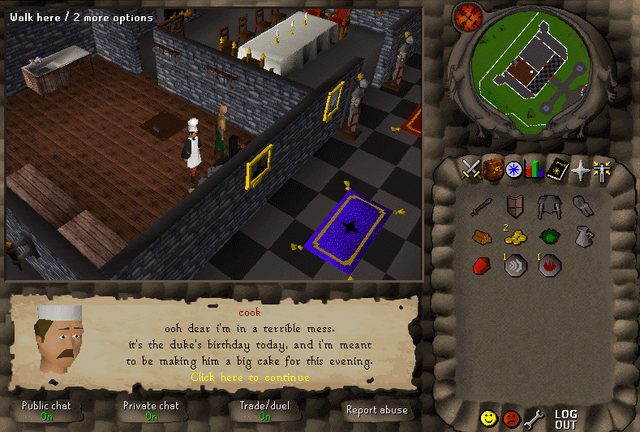
Challenges and Adaptations
Over the years, Jagex faced several challenges in managing RuneScape's growth and maintaining its quality. The company had to deal with issues such as cheating, botting, and real-world trading, which threatened to undermine the game's integrity. To combat these problems, Jagex implemented various measures, including banning thousands of accounts involved in cheating and introducing stricter rules and security features.
Despite these challenges, RuneScape continued to thrive, thanks in large part to the dedication and ingenuity of the Gower brothers and the Jagex team. The game's ability to adapt and evolve with the times, while staying true to its core principles, ensured its longevity and relevance in the ever-changing landscape of online gaming.
Departure from Jagex
By the late 2000s, the Gower brothers had begun to step back from their roles at Jagex. In 2010, Andrew Gower resigned from the board of directors but remained involved in some aspects of the game's development. This period marked a transition for Jagex as new management and development teams took over the day-to-day operations of RuneScape.
Despite their reduced involvement, the Gower brothers' influence on RuneScape's development continued to be felt. The game remained true to their original vision, with ongoing updates and expansions maintaining its status as one of the most popular and enduring MMORPGs. The Gowers' departure allowed them to explore new opportunities while leaving behind a legacy that would continue to shape the gaming landscape.
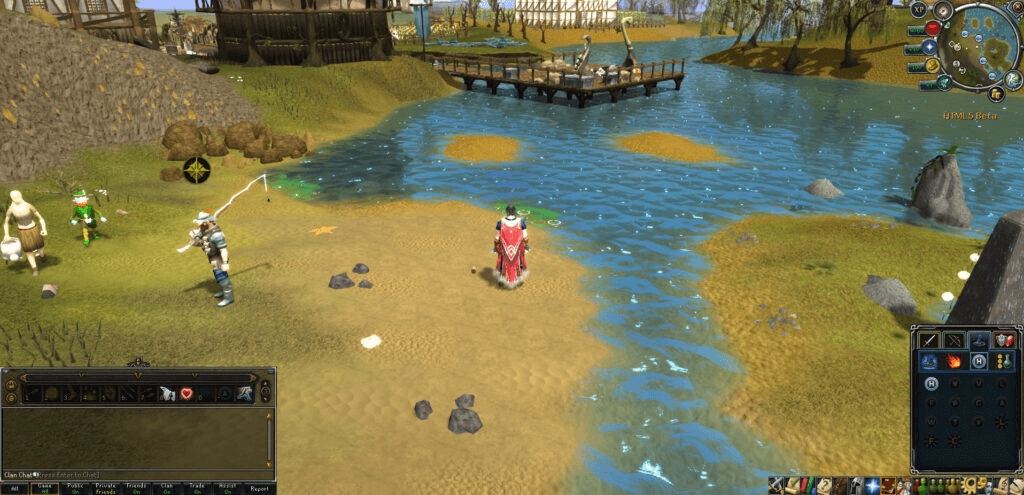
Post-Jagex Ventures
After leaving Jagex, Andrew Gower founded Fen Research, a company focused on developing new gaming technologies and projects. His work at Fen Research demonstrated his continued passion for innovation in the gaming industry. The company explored various avenues, including the development of new game engines and experimental game concepts.
Paul and Ian Gower also pursued their interests outside of Jagex. Paul continued to be involved in game design and development, contributing his expertise to various projects. Ian remained engaged with the gaming community, leveraging his skills in graphics and music to support new initiatives.
The Creation of Brighter Shores
In recent years, Andrew, Paul, and Ian Gower reunited to work on a new project, Brighter Shores. This MMORPG aims to recapture the essence of classic games like RuneScape while introducing modern elements and innovations. Brighter Shores is designed to appeal to both nostalgic players who grew up with RuneScape and new players looking for a fresh and engaging gaming experience.
Brighter Shores emphasizes open-ended gameplay, community interaction, and a richly detailed fantasy world. The Gower brothers' combined expertise in programming, content creation, and visual design is evident in the game's development. By leveraging their extensive experience, they aim to create a game that stands out in the crowded MMORPG market.
Legacy and Influence
The Gower brothers' impact on the gaming industry extends beyond their work on RuneScape and Brighter Shores. Their innovative approach to game design, player engagement, and community building has influenced numerous developers and games. RuneScape's success demonstrated the viability of browser-based MMORPGs and paved the way for other games to explore similar models.
Andrew Gower, in particular, is recognized as a visionary in the gaming world. His ability to combine technical prowess with creative storytelling has left a lasting mark on the industry. The collaborative efforts of Andrew, Paul, and Ian have shown that family-led ventures can produce some of the most beloved and enduring games.
Community and Cultural Impact
RuneScape's influence extends beyond the gaming world into popular culture. The game has a dedicated and passionate community that has grown over the years. Many players have formed lasting friendships and even relationships through their shared experiences in the game. RuneScape's player-driven economy, quest-driven narratives, and interactive gameplay have made it a cultural phenomenon, inspiring fan fiction, artwork, and community events.
The game's success has also highlighted the importance of player feedback and community involvement in game development. Jagex's commitment to listening to its players and adapting the game based on their input has become a model for other game developers. This player-centric approach is something that the Gower brothers have carried into their work on Brighter Shores.
Continuing Innovation: Brighter Shores
Brighter Shores represents a new chapter in the Gower brothers' journey, bringing their wealth of experience and innovative spirit to a fresh MMORPG. This project aims to integrate the nostalgic elements that made RuneScape a beloved classic with modern advancements in game design and technology. The game focuses on creating a vibrant, interactive world where players can shape their own adventures and build communities.
Andrew Gower has highlighted that Brighter Shores will retain the open-ended gameplay and player-driven economy that characterized RuneScape, while also introducing new mechanics and features that take advantage of current gaming trends and technologies. The game promises a seamless blend of old and new, appealing to both veteran gamers and newcomers.
[youtube=7lolGQaorPo]
The Role of Technology in Game Development
The development of Brighter Shores also underscores the evolution of technology in game development. Andrew Gower's work at Fen Research involved creating new game engines and exploring innovative technologies, some of which are likely being utilized in Brighter Shores. The advancements in graphics, artificial intelligence, and server infrastructure are enabling the creation of more immersive and expansive game worlds than ever before.
Paul and Ian Gower bring their expertise in content creation and visual design to Brighter Shores, ensuring that the game will feature rich narratives, engaging quests, and stunning visuals. Their combined efforts aim to create a game that not only honors the legacy of RuneScape but also pushes the boundaries of what modern MMORPGs can achieve.
Community Engagement and Future Prospects
A key element of Brighter Shores' development is community engagement. The Gower brothers understand the importance of building a strong, active community around the game. They are committed to involving players in the development process, soliciting feedback, and making adjustments based on player input. This approach not only helps to create a game that meets players' expectations but also fosters a loyal and dedicated player base.
Looking ahead, the Gower brothers have ambitious plans for the future. They aim to continuously expand and improve Brighter Shores, adding new content, features, and events to keep the game fresh and exciting. Their vision is to create a living, evolving game world that players can explore and enjoy for years to come.
The Enduring Legacy of the Gower Brothers
The Gower brothers' contributions to the gaming industry extend beyond the games they have created. They have set a standard for innovation, community engagement, and collaborative development that has inspired countless other developers. Their journey from the early days of RuneScape to the launch of Brighter Shores is a testament to their passion for gaming and their dedication to creating immersive, enjoyable experiences for players.
Andrew, Paul, and Ian Gower have shown that with creativity, perseverance, and a commitment to quality, it is possible to create games that capture the imagination and loyalty of millions of players. As they continue to innovate and explore new possibilities in game development, their legacy as pioneers in the gaming industry is secure.
You Might Also Like
Recent News
 Fen Research & Brighter Shores: Andrew Gower's Final Joke
Fen Research & Brighter Shores: Andrew Gower's Final Joke Herbalist's Hurdle Quest Launch
Herbalist's Hurdle Quest Launch Weekly Leek #2
Weekly Leek #2 Weekly Leek #1
Weekly Leek #1 Brighter Shores Easter Event (2025) - All 128 Hidden Egg Locations
Brighter Shores Easter Event (2025) - All 128 Hidden Egg Locations 2nd April 2025 - Easter Event
2nd April 2025 - Easter Event Teloril Breaks Down the Online Safety Act and Its Impact
Teloril Breaks Down the Online Safety Act and Its Impact Easter Event, Team Expansion, and Upcoming Game Updates
Easter Event, Team Expansion, and Upcoming Game Updates

